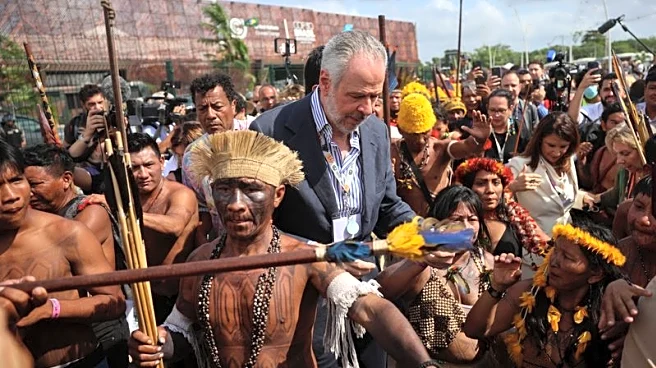By Adriano Machado
BELEM, Brazil (Reuters) -Dozens of Indigenous protesters blocked the front of the COP30 summit venue in Brazil on Friday morning, staging a sit-in that forced delegates to use a side
entrance to resume their negotiations on tackling climate change.
Security guards stepped up checks during the peaceful protest, and delegates formed long lines waiting to enter the sprawling compound, which is built on the site of an old airport in the Amazon city of Belem.
The venue is hosting the annual U.N. climate conference where delegates from 195 governments are seeking to secure progress on halting the rise in global temperatures that threatens delicate and essential ecosystems including the Amazon rainforest.
The protesters are demanding that the Brazilian government halt development projects in the Amazon, including mining, logging, oil drilling and the building of a new railway for transporting mining and agricultural products.
"President Lula, we are here in front of COP because we want you to listen to us. We refuse to be sacrificed for agribusiness," read a statement from the Munduruku Indigenous group that carried out the protest.
Brazilian President Luiz Inacio Lula da Silva has highlighted Indigenous communities as key players in this year's COP30 negotiations.
The Munduruku territory covers nearly 24,000 square km (9,000 square miles), about the size of the U.S. state of New Hampshire, in the heart of the Amazon rainforest in Northern Brazil.
"We are the ones who protect the climate, and the Amazon cannot continue to be destroyed to enrich big companies,” the Munduruku statement added.
COP30 President Andre Correa do Lago was seen negotiating with the group outside the venue. The U.N. climate body said there was no danger from the protest.
On Tuesday, dozens of Indigenous protesters forced their way into the COP30 venue and clashed with security guards at the entrance. They later defended that action, saying they wanted to demonstrate the desperation of their fight for forest protection.
(Reporting by Adriano Machado, Valerie Volcovici and Katy Daigle; editing by William James and Andrew Heavens)









